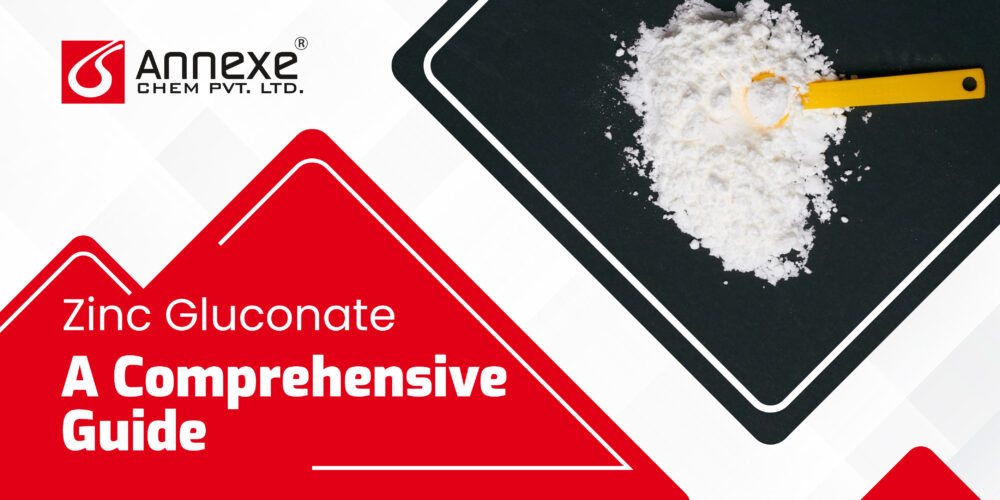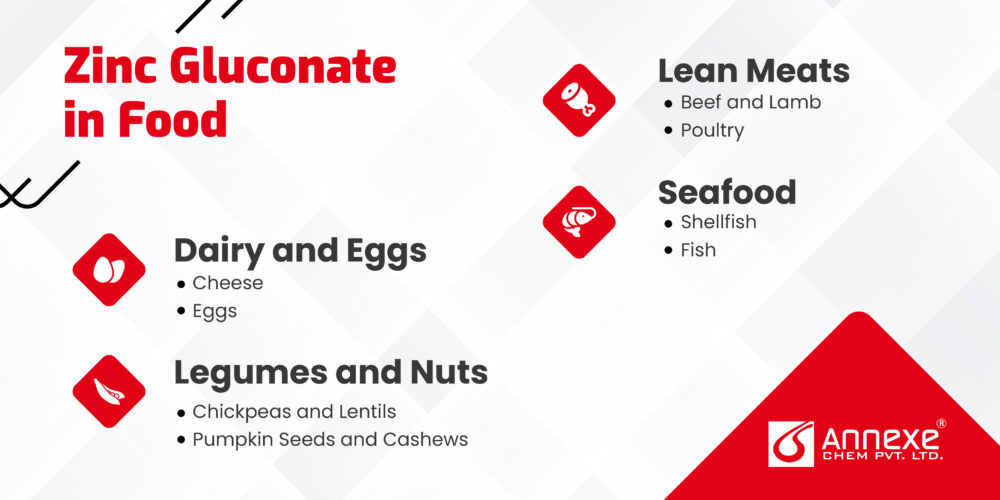Zinc Gluconate: A Comprehensive Guide - Annexe Chem Pvt Ltd
Zinc Gluconate: A Comprehensive Guide

- December 18, 2023
- By Akshita Patel
Zinc Gluconate is a chemical compound formed by combining zinc, an essential mineral, with gluconic acid, a naturally occurring organic acid derived from glucose. This compound is commonly used as a dietary supplement to provide a bioavailable form of zinc, which the body can easily absorb and utilize. Zinc itself is an essential trace element crucial for various physiological functions in the human body, including immune system support, wound healing, DNA synthesis, and antioxidant activity. Zinc Gluconate is available in various forms, such as tablets, capsules, and lozenges, and is often used to address zinc deficiencies or as a preventive measure to support overall health.
The Role of Zinc in Health
Zinc’s Functions in the Body
1. Immune System Support
- Role: Zinc is a critical component for the proper functioning of immune cells, including white blood cells and neutrophils.
- Mechanism: It aids in the development and activation of immune cells, enhancing the body’s ability to defend against pathogens.
- Importance: Zinc deficiency can compromise immune function, leading to increased susceptibility to infections and prolonged recovery times.
2. Wound Healing
- Role: Zinc is essential for various stages of the wound healing process, including blood clotting, inflammation control, and tissue repair.
- Mechanism: It promotes collagen synthesis, a crucial protein for skin structure, and accelerates the closure of wounds.
- Importance: Adequate zinc levels are vital for speedy recovery from injuries, surgeries, and skin-related issues.
3. DNA Synthesis
- Role: Zinc plays a key role in DNA replication and repair, influencing cellular growth and division.
- Mechanism: It stabilizes the structure of DNA and is involved in the activity of enzymes critical for DNA synthesis.
- Importance: Proper zinc levels are crucial for maintaining genetic integrity, and deficiencies can impact reproductive health and fetal development.
4. Antioxidant Properties
- Role: Zinc acts as an essential component of antioxidant enzymes, such as superoxide dismutase (SOD).
- Mechanism: It helps neutralize free radicals, reducing oxidative stress and protecting cells from damage.
- Importance: By mitigating oxidative stress, zinc contributes to overall health, potentially influencing the aging process and reducing the risk of chronic diseases.
Health Benefits of Zinc Gluconate
Zinc gluconate, a form of the essential mineral zinc, is gaining recognition for its diverse range of health benefits. Incorporating zinc gluconate into your health regimen can be a proactive step towards fortifying your immune system, supporting skin health, enhancing cognitive function, and ensuring reproductive well-being. While it’s crucial to meet recommended daily intake levels, consulting with healthcare professionals before initiating any supplementation is advisable. Embrace the health benefits of zinc gluconate and empower your body to thrive.
A. Immune System Boost
- Zinc’s Immune Modulation: Zinc gluconate plays a pivotal role in supporting immune function by regulating the activity of immune cells.
- Reducing Severity and Duration: Studies suggest that zinc supplementation can reduce the severity and duration of common colds and respiratory infections.
B. Skin Health and Wound Healing
- Collagen Synthesis: Zinc is an essential component in the synthesis of collagen, a structural protein crucial for skin integrity.
- Wound Closure: Zinc gluconate aids in wound healing, promoting faster recovery from injuries, surgeries, and skin conditions.
C. Cognitive Function
- Neurotransmitter Regulation: Zinc is involved in the regulation of neurotransmitters, influencing cognitive functions such as memory and learning.
- Protecting Against Neurodegeneration: Adequate zinc levels may contribute to neuroprotection, potentially reducing the risk of neurodegenerative diseases.
D. Reproductive Health
- Sperm Health: Zinc is crucial for maintaining optimal sperm count, motility, and morphology in men.
- Female Reproductive Health: In women, zinc supports reproductive health and plays a role in fetal development during pregnancy.
E. Antiviral Properties
- Inhibiting Viral Replication: Zinc has shown antiviral properties by inhibiting the replication of certain viruses.
- Respiratory Virus Protection: Zinc gluconate lozenges have been explored for their potential to reduce the severity of respiratory viral infections.
Zinc Gluconate in Treating Common Ailments
1. Immune System Support:
- Boosting Immunity: Zinc gluconate is a stalwart supporter of immune function, crucial in preventing the onset of colds and flu.
- Reducing Symptom Severity: Studies suggest that timely zinc supplementation may lessen the severity and duration of cold symptoms.
2. Zinc Lozenges for Respiratory Health:
- Local Action: Lozenges containing zinc gluconate can be particularly effective in targeting viruses in the throat.
- Reducing Viral Replication: The presence of zinc may hinder the replication of viruses responsible for respiratory infections.
3. Collagen Synthesis for Skin Repair:
- Promoting Skin Healing: Zinc gluconate’s role in collagen synthesis aids in repairing damaged skin.
- Reducing Inflammation: The anti-inflammatory properties of zinc can be beneficial for managing conditions like acne.
4. Antioxidant Protection:
- Fighting Free Radicals: Zinc acts as an antioxidant, protecting the skin from oxidative stress.
- Balancing Oil Production: Zinc may help regulate sebum production, contributing to a clearer complexion.
5. Restoring Gut Health:
- Zinc’s Impact on Intestinal Function: Zinc gluconate can assist in restoring the integrity of the intestinal lining.
- Reducing Duration of Diarrhea: In cases of acute diarrhea, zinc supplementation has been associated with a shorter duration of symptoms.
6. Zinc for Children with Diarrhea:
- Pediatric Applications: Zinc supplementation is recommended for children with diarrhea to reduce the severity and duration.
- Preventing Future Episodes: Regular zinc intake may play a role in preventing recurrent episodes of diarrhea in children.

Zinc Gluconate in Food
Zinc is an essential mineral crucial for various bodily functions, and incorporating it into our diet is paramount for overall health. One effective source of zinc is through the consumption of foods containing zinc gluconate.
A. Natural Food Sources of Zinc
Lean Meats:
- Beef and Lamb: These meats are excellent sources of zinc, providing the body with easily absorbable forms of the mineral.
- Poultry: Chicken and turkey are lean options that contribute to daily zinc intake.
Seafood:
- Shellfish: Oysters, crab, and shrimp are particularly high in zinc, offering a seafood option for those looking to boost their zinc levels.
- Fish: Salmon and trout also contain moderate levels of zinc.
Dairy and Eggs:
- Cheese: Certain types of cheese, such as cheddar and Swiss, provide zinc in addition to being rich in calcium.
- Eggs: Egg yolks are a good source of zinc, along with other essential nutrients.
Legumes and Nuts:
- Chickpeas and Lentils: Legumes are plant-based sources of zinc, suitable for vegetarians and vegans.
- Pumpkin Seeds and Cashews: Nuts and seeds contribute to zinc intake, offering a nutrient-dense snack option.
Incorporating Zinc-Rich Foods into the Diet
- Protein Variety: Include a mix of animal and plant-based proteins in meals to diversify zinc sources.
- Whole Grains: Pairing zinc-rich foods with whole grains ensures a well-rounded nutritional profile.
- Trail Mix: Create a trail mix with nuts and seeds for a convenient and zinc-packed snack.
- Yogurt with Berries: Enjoying yogurt with zinc-rich berries is a tasty way to boost your intake.
Balancing Supplemental Zinc with Dietary Intake
Consulting Healthcare Professionals:
- Individual Needs: Consult with healthcare professionals to determine if zinc supplementation is necessary based on individual health needs.
- Supplemental Support: If supplementation is advised, choose high-quality zinc gluconate supplements to complement dietary intake.
Incorporating zinc gluconate into our diet is achievable through a balanced and diverse selection of foods. Whether sourced from meats, seafood, dairy, or plant-based options, maintaining adequate zinc levels contributes to overall well-being. Balancing dietary intake with supplements, if needed, ensures that we harness the full nutritional benefits of zinc gluconate, supporting our bodies in performing optimally.

Akshita Patel
As an advocate for sustainability, Akshita is committed to driving positive change within the chemical industry. She actively seeks out environmentally friendly solutions and promotes the adoption of sustainable practices. Akshita believes that a balance between economic growth and ecological responsibility is crucial for the industry's long-term success. She is dedicated to finding innovative ways to minimize environmental impact while maximizing efficiency and profitability.
Related Blogs

- July 25, 2023
- By Akshita Patel
The Future of Chemical Manufacturing: Advancements.
The production of diverse chemicals, materials, and goods that are necessary for a variety of industries.

- January 24, 2024
- By Akshita Patel
Thiourea: Unraveling Its Diverse Applications
Thiourea is an organosulfur compound with the formula SC(NH₂)₂ and the structure H₂N−C−NH₂. The sulfur atom.



